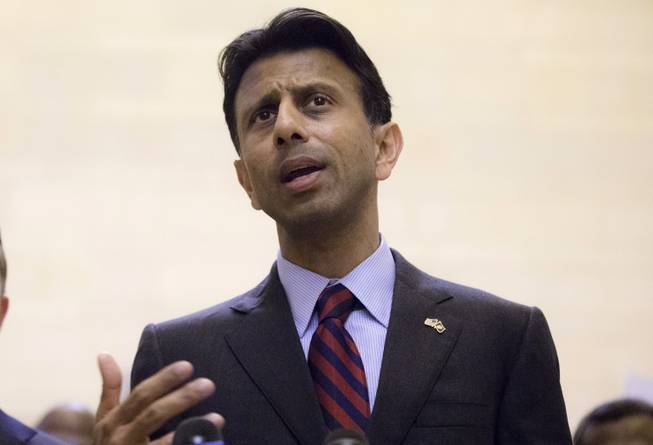
John Minchillo / AP
In this Oct. 16, 2014, file photo, Louisiana Gov. Bobby Jindal, R-La. speaks in New York. More than a dozen potential Republican candidates are contemplating White House bids in 2016 in what’s shaping up as a crowded and diverse field.
Tuesday, Jan. 20, 2015 | 4:13 p.m.
WASHINGTON — Louisiana Gov. Bobby Jindal plans to double down on the assertion there are neighborhoods in Western nations where Islamic traditions trump civic laws, a move that appears aimed at standing out in a crowded field of potential Republican candidates for president.
Yet some in his party question if it's a strategy that has the potential to resonate in the early voting states of Iowa, New Hampshire and South Carolina, especially if well-funded establishment favorites — including former Florida Gov. Jeb Bush and 2012 GOP nominee Mitt Romney — join the race.
"He's in a battle for headlines in a field that includes Jeb and Mitt," said Ford O'Connell, a Republican strategist who advised John McCain's presidential bid on connecting with rural voters.
The hubbub began Monday in London, when Jindal told a think tank audience that some countries have allowed Muslims to establish autonomous "no-go zone" neighborhoods in cities where they govern by a harsh version of Islamic law. Jindal also said non-Muslims avoided the neighborhoods.
Aides said that Jindal, who returns from Europe late Tuesday, planned to repeat the statements on Wednesday. His advisers provided a handful of media reports suggesting that Muslims in some European countries have asserted control over law enforcement functions in certain neighborhoods.
But British Prime Minister David Cameron has called such assertions bunk. Fox News apologized for airing an interview with an American author who made similar assertions, and an official with Paris' City Hall said Tuesday the city plans to sue Fox News for airing the statements.
Like many other countries, Britain and France have crime-plagued neighborhoods where outsiders risk muggings and violence. In Europe, some of these areas are predominantly Muslim, in large part because they were settled by poor families from former colonies with Muslim majorities.
While drug gangs and radical imams sometimes vie for influence in these zones, none is subject to the rule of Sharia. Muslims in some European countries can legally consult Sharia councils — often erroneously called Sharia courts — for the settlement of family disputes. But these councils have never replaced the law of the land or the authority of police and courts.
Jindal is no stranger to using high-intensity language in a bid to win attention. Shortly after Mitt Romney failed to win the presidency in 2012, Jindal excoriated Republicans to "stop being the stupid party." He also demanded that flights from Ebola-stricken African countries be banned, despite Centers for Disease Control Director Tom Frieden's statement that such a travel ban would not work.
Jindal has been relentless in his criticism of Common Core education standards, calling them a "scheme by the federal government to nationalize curriculum." The standards are not a curriculum and were developed in the states, and Jindal once supported them before they became a target of some conservatives.
Jindal's rhetoric has found an audience on cable news shows, but it hasn't yet translated into much excitement for a potential 2016 campaign. He has low approval ratings in his home state and is seldom mentioned when Republican donors discuss their options for a GOP nominee.
Just 14 percent of Republicans want Jindal to run for president, according to a CBS News poll released over the weekend. The same poll found that 20 percent want him to stay out of the race altogether. That was the lowest level of support among the group of likely Republican contenders included in the poll who, like Jindal, are trying to court the party's evangelical vote.
Jindal has invited thousands of Christian faithful to Baton Rouge, Louisiana, this weekend for a day of prayer. Texas Gov. Rick Perry used a similar event in 2011 to help launch his campaign.
O'Connell, the former McCain adviser, said Jindal's comments about Muslim enclaves might help him get a look from faith leaders and those voters attending such an event.
"A lot of pastors in the rural countryside are going to be a little more sympathetic to what Jindal is saying and will give him the benefit of the doubt," O'Connell said.
But activists in early nominating states, where a lesser-known candidate can find success through the hard work of retail, person-to-person campaigning, said Tuesday they've largely only heard from Jindal on TV so far.
"A lot of people know who he is, but haven't had a lot of exposure directly," said Iowa GOP co-chairman Cody Hoefert.
Associated Press Europe Editor Niko Price in London contributed to this report.

Join the Discussion:
Check this out for a full explanation of our conversion to the LiveFyre commenting system and instructions on how to sign up for an account.
Full comments policy